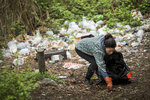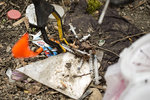

On a Sunday morning, 17 people of all ages descended on a greenbelt near the Montlake Cut with gardening gloves, trash-grabbers and black plastic bags to help a man named Alec clean up his camp.
This was the second time this group had been there to clean. The first time, they left Alec’s camp untouched to respect his privacy. Now, with people all around picking up his trash, Alec felt embarrassed.
“This feels really awkward,” he said. “It’s my mess. I’m a drug addict — I hate to fall back on that — but I’ll just be brutally honest. I can’t get my (expletive) together.”
But the people cleaning were friendly and all smiles. Some were volunteers with Facing Homelessness, an advocacy group for homeless people. Others, like Cheryl Strother, a neighbor who found out about the event on the Nextdoor website, had mixed emotions.
The Seattle Times’ Project Homeless is funded by BECU, The Bill & Melinda Gates Foundation, Campion Foundation, the Paul G. Allen Family Foundation, Raikes Foundation, Schultz Family Foundation, Seattle Foundation, Seattle Mariners, Starbucks and the University of Washington. The Seattle Times maintains editorial control over Project Homeless content.
“I’m frustrated that this is allowed to grow,” Strother said as she worked. “Cleaning it up is what I’ve been wanting to do for years.”
Much of the outrage at and frustration with homelessness welling up in Seattle — a city so green it’s nicknamed The Emerald City — is the result of trash spilling from tent camps, and what some neighborhood and business groups feel is a tepid response by the city.
In 2017, Seattle Public Utilities (SPU) picked up over 3,000 tons of garbage, mostly during massive camp cleanups in and around The Jungle, a large homeless encampment that sprung up under Interstate 5. In 2018, they picked up a little over 1,000 tons, and 2019 is on pace to be the same.
While the city has launched some new cleanup efforts, including distributing bags at tent camps and doing more cleanups around clusters of RVs, Seattle is cleaning up nowhere near the amount of trash it was two years ago.
Many people in the tent camps share the public’s frustration. People camping describe trying to keep their areas neat, only to have neighbors move in with no regard for cleanliness. Hoarding disorder is prevalent among homeless people (people with hoarding disorder are at a much higher risk of being evicted), but even someone with far fewer possessions than the average housed American can look messy when their things are out in public.
George Scarola, who helped manage the city’s response and outreach around homelessness for years, spent hours volunteering before work, picking up trash around spots like Licton Springs tiny-house village.
“To me, this whole thing is about management,” Scarola said. “We cannot solve homelessness in the city of Seattle. We just don’t have the ability to create the number of housing and affordable housing the city needs. So we have to manage this problem. It’s a very tricky balancing act.”
Piles of Purple Bags
The politics of trash are complicated in Seattle, in part because providing sanitation services to a camp that is technically illegal is, in a way, sanctioning it. In 2016, the Seattle City Council considered removing fewer unsanctioned tent camps that were deemed unsanitary and instead providing the camps with garbage containers and portable toilets, for example.
Many citizens, feeling an increase in camping in neighborhoods after the sweep of The Jungle, opposed the idea of removing fewer camps. The bill died in committee.
But soon after, SPU launched a pilot program to give people in camps the chance to clean up their own trash, with pickups of bags once or twice a week at about 10 unsanctioned encampments. The city and partner agencies gave out purple bags stamped with Chief Seattle’s profile that SPU picked up for free.
Chris Erickson has managed to stay in one camp on the edge of Dr. Jose Rizal Park for two years with the help of those purple bags. There’s a pile about 200 feet away from his camp, where SPU picks up his and other campers’ trash every week.
He figured out that keeping his camp clean meant he had a much lower chance of being forced to move. He has built a two-story cabin out of pallets with plexiglass windows. He keeps everything within the wood-pallet fence that marks his “yard” picked up; he even has a makeshift trash can with a purple bag in it.
“There’s a lot of people who don’t realize what that’s here for,” said Erickson, who sometimes wishes the garbage pile wasn’t so visible to people driving by. He’s conscious of his camp’s public image, and he says the trash and needles that do pile up are from people just passing through. The longtime campers are more dependable.
“I think people who actually live here and are involved,” Erickson said. “They clean up after themselves.”
Not a Silver Bullet
The pickups only work in the more organized, cohesive tent camps. As of September 2018, SPU had distributed 18,545 trash bags, and only 4,821 were returned full of trash. Even some of the ones returned had been ripped apart by people looking for needles with a bit of heroin left, said Erickson and others with knowledge of the program.
These and other reasons could be why SPU, which declined repeated interview requests, hasn’t expanded the program. The city spent around $3.6 million last budget cycle on “cleanup activities,” which include distributing purple bags, removing encampments and picking up needles and litter near camps.
Erin Goodman leads the Sodo Business Improvement Area and often deals with her members’ trash issues. Although the city has responded and tried to mitigate the problem, she feels the sheer number of encampments stymies the city.
“Efficiency and effectiveness are being held at bay by emotional feelings and concerns,” Goodman said. “And I don’t have an answer for you what we should do, but I think the current situation at the vast majority of these encampments is unsanitary and unsafe for the people living in them.”
A common frustration with SPU is lack of transparency around how the utility decides what to clean up. The city does seven cleanups a month around RV camps, which Goodman feels is arbitrary. City Councilmember Lisa Herbold feels same.
“We asked (SPU) the other day, how many locations did you assess — and they said they assessed 10,” Herbold said. “And we said, ‘There’s a lot more than 10 locations that could be remediated in the city.'”
Herbold said she’s laying the groundwork to push for expansion of these programs during budget deliberations this fall, but added there’s no way the city has enough money to offer a solution for all of the roughly 400 camps Seattle deals with at any given time. A solution to the trash issue will have to come with a solution for homeless camps.
If Seattle set up portable toilets and removed the trash at all tent camps, said Scarola, the former city employee, “You would be overwhelmed by even more people who said ‘Oh, it is OK to live outside, the city has a service to provide garbage (service) and provide port-a-potties for people who live outside.’”